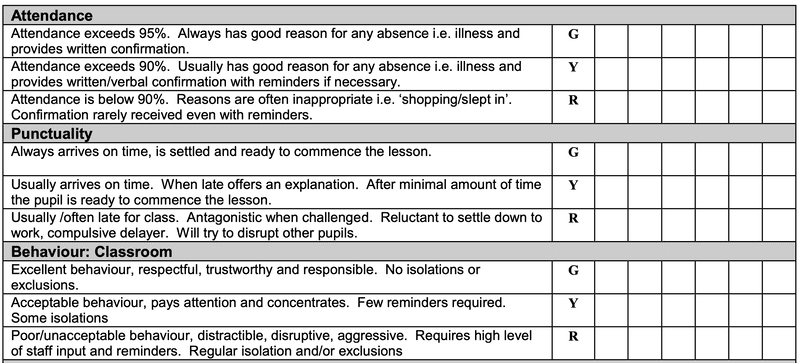AIM: To promote positive attitudes to learning and good behaviour by a consistent approach to rewards and sanctions across the whole school.
Low-level disruptive behaviour is probably responsible for derailing more lessons than almost anything else. When combined with poor attitudes to learning the effect is to make good pupil progress practically impossible.
We have found that in schools where behaviour is an issue:
- There is no consistency of approach across the school
- Positive behaviour for learning is still not embedded
- Rewards do not motivate the pupils
- Sanctions are ineffective.
Our Attitude and Behaviour System is specifically designed to address these issues and has proved to be most effective – even in the most challenging of circumstances.
Assertive Mentoring has had a ‘transformational effect on children’s attitudes to learning.’
Ashfield Junior School, Workington, Cumbria: Ofsted Report
1. Attitude Criteria: Sample
Achieving consistency is the first goal. ‘Attitude’ is carefully tracked at least termly against agreed criteria and in discussion with the child. This includes attendance, punctuality, behaviour, effort, homework and uniform. Each area is colour coded: Green-excellent/very good, Yellow-acceptable/satisfactory, Red-poor/unacceptable. Targets and support are agreed where necessary.
From this we develop our ‘Good to be Green’ system. Expect the pupils to want to be green and aspire to be so. This quickly impacts on the whole culture and ethos of the school.
The whole-school ‘Good to be Green’ system has transformed the behaviour, attitudes, attendance and attainment of our children. In just one year, progress has gone from one of the lowest schools in the country to one of the top. Attainment has risen by 25%. We were identified as one of the two most improved schools in West Yorkshire. I can testify that Assertive Mentoring really works!
Annie McNally, HT: St Malachy’s Catholic Primary, Halifax
Each time the ‘Pupil Profile’ is completed a copy is sent home which keeps parents informed and allows them several opportunities to reward and encourage their child; to seek assistance with any issues or inform the school of any underlining factors affecting the child’s recent attitude. In this way, a true home/school partnership develops based, not on blame but, joint concern and a solution-based approach.
Additional Guidance
Expectations are also reinforced across the school through posters, reminders and routines including: Listening Code, Line-Up Code, Movement Code, Rights and Responsibilities etc.
2. Whole-School Reward System
For success and impact, it is crucial that any reward system is seen as fair and is consistently applied to all. Many schools make the mistake of ‘rewarding’ attention seeking behaviour with attention, thus perpetuating the problem. Worse, the well-behaved children can often feel overlooked and neglected.
We always reward positive attitudes and behavior and consistently and proportionately respond poor behaviour.
As well as the normal everyday rewards (praise, smiles, marking etc) we use a consistent approach for rewarding and encouraging good behaviour, effort and manners based on the collection of ‘smiley faces’. Smiley faces may be awarded by any adult, for any actions, deeds or attitudes which are deemed noteworthy and may include:-
- Particularly good work/effort
- Displaying good manners
- Displaying a caring attitude towards others
- Staying on task
- Ignoring the distractions of others etc.
When awarding the Smiley the member of staff should reinforce the good behaviour e.g. ‘You can have a Smiley for waiting so patiently’. Once awarded a Smiley can never be deducted. Every child has a ‘smiley card’ on which to collect their stickers across the year.
Pupils are enthusiastic and keen to learn and strive to achieve their targets. Pupils spoke eagerly about earning ‘smilies’ and how it was ‘good to be green’. (Windmill Hill Primary: Ofsted Report, Satisfactory to Good)
| Any noteworthy behaviour | 1 Smiley (recorded on class chart) |
|---|---|
| 10 Smileys | Teacher commendation: (recorded on individual achievement card) |
| 100 Smileys | Team Leader commendation: Bronze Award (presented by Team Leader) |
| 200 Smileys | Headteacher commendation: Silver award (presented by Headteacher) |
| 300 Smileys | School commendation: Gold award (in front of whole school) |
As well as rewarding individual success, the system also acts to motivate the class to achieve collectively.
If all children in a class achieve Bronze, Silver or Gold Awards they may have an appropriate class treat of their choice including: class party, class disco, additional art/PE, movie etc. The reward should reflect the achievement i.e.
- Bronze Party: up to one session
- Silver Party: up to half a day
- Gold Party: up to a full day
Additional Rewards
A weekly ‘Going for Green’ assembly is dedicated for the praise and recognition of children who have made particularly noteworthy progress for Attainment, Achievement or Attitude. Parents are personally invited to attend and witness the presentation of certificates.
A ‘Class of the Week’ trophy is also presented each week which is determined by playtime and lunchtime behaviour. Winners receive an appropriate class treat of their choice i.e. additional playtime, choosing time etc.
We were in Notice to Improve. Now we have been judged as good with outstanding features. HMI said AM has had a ‘transformational effect on children’s attitudes to learning’.
J. Ditchburn, HT: Ashfield Junior, Workington
3. Whole-School Sanctions System
Easy as 1, 2, 3, A, B, C
Pupils learn from experience to expect fair and consistently applied sanctions which differentiate between serious and minor offences. We use a simple 1, 2, 3, A, B, C sequence which the children know and understand.
1, 2, 3: Three reminders/verbal warnings of which the third is the final.
A, B, C: Isolations of 10 minutes, 1 hour, or the rest of the day (for repeat offences or refusal).
The priority is always to ensure that teaching and learning continues undisturbed and that poor behaviour is starved of attention. The child can always prevent further sanction by stopping the behaviour causing the problem and will start the next day afresh. Experience has shown that children rarely go beyond an Isolation B without correcting their own behaviour.
On Report and Beyond
For the tiny minority of children who may regularly present unacceptable behaviour, a more in-depth behaviour profile is available to identify specific targets and strengths. These targets become the focus of any support provided as well as a weekly report on progress. This is still based on positive feedback and the collection of ‘smilies’. Being ‘On-Report’ lasts a minimum of 2 weeks and a maximum of 20 as the child is weaned into acceptable behavioural traits whilst rewarded with positive attention.
If substantial progress has not been made by 20 weeks or if the behaviour is so serious to be deemed a major threat to the smooth running of the school or pupil safety, the sanctions procedure extends into behaviour contracts, internal and external exclusions which includes permanent exclusion.
Additional Resources
The product contains many additional resources to promote positive attitudes and motivate pupils.
- Comprehensive Policies and Procedures for Behaviour, Anti-Bullying, Racial Equality, Movement Around School, Use of Force etc
- Risk Assessment Procedures and Reporting System
- Stakeholder Surveys and Self-Evaluation
- Certificates, Smiley Cards, Motivational Posters
- Isolation Records, Standard Letters to Parents, Policy Reminder Letters
Pupils’ self-confidence and attitudes to learning have changed beyond recognition.
Mount Pleasant Primary, Darlington: Ofsted Report

